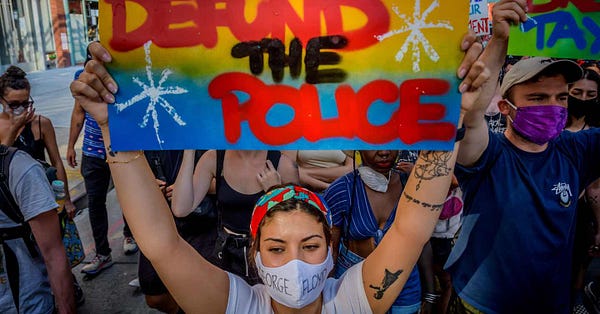Happy Tuesday —
Since yesterday was Labor Day, I revisited some related essays and books and dissected Jay-Z’s latest comments on capitalism.

Some news you should check out:
The entire world should be focused on Pakistan right now. Over 1,300 people have died, and a third of the country is underwater. The climate minister is, rightfully, calling for climate reparations.


The entire country should be focused on Mississippi and the water crisis that has been unfolding there.

Vox launched a podcast series focused on reparations.


The Pew Research Center released findings from a national survey of Black people on issues of racial inequality and social change in the US.
Germany rejects Poland’s claim it owes over a trillion in war reparations.
Mariame Kaba and Andrea Ritchie published a new book and vision for a world without police or prisons.


With radical love,
Trevor
Opinion
Late last week, veteran rapper and business mogul Jay-Z took to Twitter to defend Black capitalism. As he discussed other recent Black billionaires (Rihanna, Kanye West, Lebron James), he offered a valid critique of the American dream before taking a major left turn. “When we start getting in, they tried to lock us out of it, they start inventing words like you know, ‘capitalist, you know, things like that,” he stated.
Like many celebrities, philanthropists, and others who have accumulated immense wealth, Jay-Z conflates building Black wealth with the liberation of Black people.
I think there are two things that Jay-Z overlooks in his analysis:
Racial justice will not be achieved through building the wealth of a few Black people.
Economic exploitation is a critical factor of the American experiment.
Adam Smith, often regarded as “The Father of Economics,” stated that the prosperity of a new colony depended on one economic factor — “plenty of good land.”
And as Dr. Greg Carr stated in his Labor Day tweet, the theft of land, bodies, and labor enabled the United States to become what we now see today.

It’s essential in our ongoing fight for social, racial, and gender justice to understand European colonization of the Americas as a continuous structure rather than a series of past events.
In other words, the project of the United States was not just founded on the need to control Indigenous land and Black labor — it is still driven by this need.
In their latest book, Histories of Racial Capitalism, Destin Jenkins and Justin LeRoy argue that “if race came into being to justify the social dynamics of capitalism, then racial justice cannot thrive under capitalism.” Racial capitalism’s adaptability, LeRoy argues, “ensured the transferability of systems of inequality beyond the slavery/freedom divide.”
Therefore, our emancipation from racial capitalism is a necessary precondition to complete liberation.
With that, I’ll leave you with this James Baldwin quote:
“They needed us for labor and for sport, now they can’t get rid of us. We cannot be exiled, and we cannot be accomodated, Now, something’s got to give.”
National News
New York Times: The First A.P. African American Studies Class Is Coming This Fall
MacArthur Foundation: Reparations Summit: Learning the Past, Healing and Repairing Our Future
USA Today: This teachers union brought affirmative action into its layoff practices. Will more follow?
The Guardian: Confederates were traitors’: Ty Seidule on West Point, race and American history
Native News Online: Chippewa Tribe Gets 1,500 Acres of Lake Superior Land Back in NW Wisconsin
The Nation: Where Solidarity, Abolition, and Queer History Meet
The New Yorker: Biden’s Student-Debt Plan Could Chip Away at the Racial Wealth Gap
New York Times: Why I Changed My Mind on Student Debt Forgiveness
Inside Philanthropy: Two Years After Historic Uprisins, Where Does Philanthropy’s Commitment to Racial Justice Stand?
Washington Post: Joe Biden working while covid-sick was not ‘white supremacy’
Al Jazeera: The blue wall of white supremacy needs to go
The Guardian: Conservative Texas phone company fueling extremist takeover of schools
New York Times: Proving Racists Wrong Is Not a Trivial Pursuit
New York Times: Ibram X. Kendi on new book confronting racism for a new generation
Essence: Let's Remember These Black Freedom Fighters For Black August
US News & World Report: Black August Uplifted as Alternative Black History Month
Regional News
WHYY: As New Jersey examines wealth disparities, advocates say reparations should be on the table
San Fransisco Bay View: Reparations Teach-In comes to San Francisco
Evanston Roundtable: Evanston wants to know: What do you think about reparations?
Baltimore Sun: Reparations is about more than money, it’s about acknowledging injustice
CNN: Alabama superintendent fights to remove Confederate school names
NPR: BYU says it has no proof that the fan banned over racist slurs said them
Philadelphia Tribune: Slavery, born exactly 403 years ago, was much worse than you think
International News
New York Times: The Long Road Ahead for Colonial Reparations
The Guardian: Canadian city pulls bison sculpture in row over representation of colonialism
CNN: 41% of Black and minority workers in the UK are suffering racism on the job
The Guardian: Beware the ‘ghostliners’: people who downplay Britain’s slavery shame and mute calls for justice
The Guardian: Edinburgh to apologise over historical links to slavery



